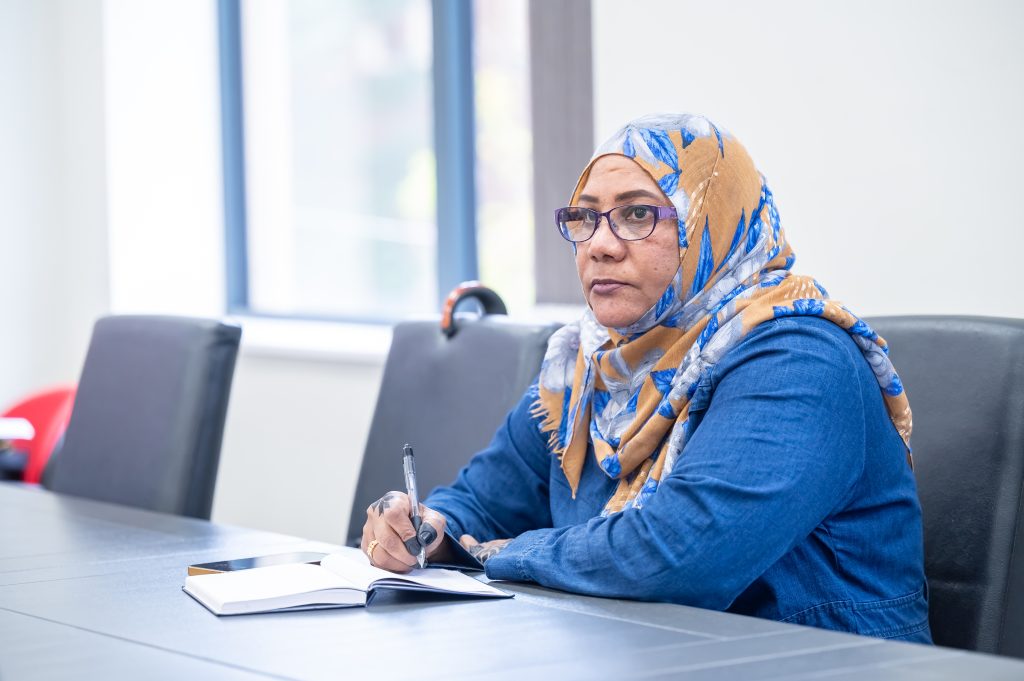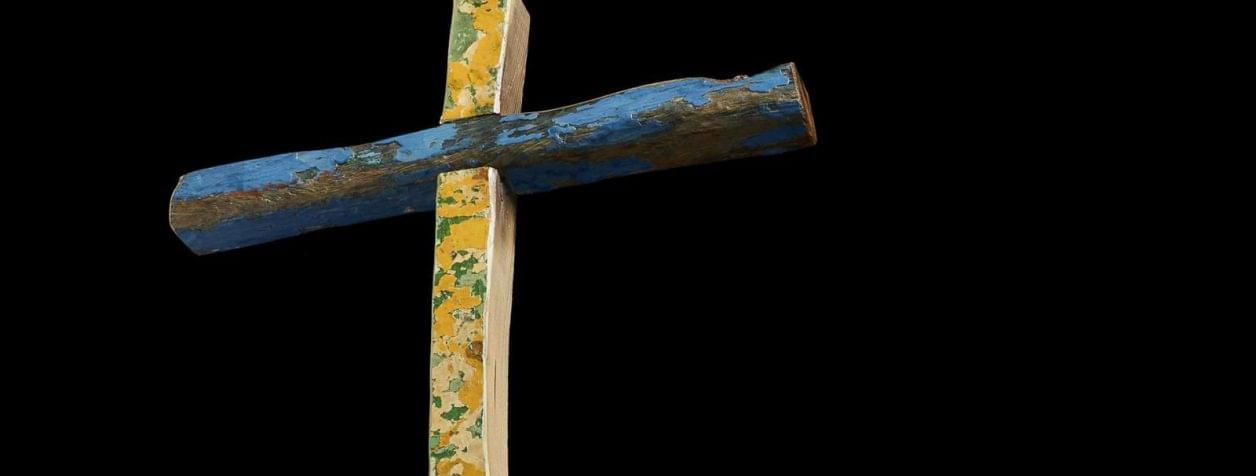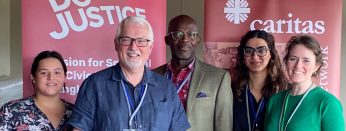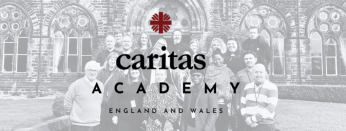With the UK ‘at a pivotal crossroads,’ grappling with global instability and the subsequent number of people seeking safety and a better life within its borders, the Church and faith-based charities are increasingly playing a key role in supporting and welcoming people to our shores.
Here, Patrick O’Dowd, director of Caritas Salford and Chair of the CSAN Migration Alliance, explains the importance of the compassion and solidarity of charities in the provision of what should be a practical and pastoral priority, but warns that reliance on charities without accompanying legislative and funding support is dangerous and could lead to potentially catastrophic situations.
As we approach the Church’s annual celebration of World Day of Migrants and Refugees, the United Kingdom is certainly at a pivotal crossroads. With increasing numbers of individuals and families finding themselves displaced around the globe due to significant instabilities, respecting the human dignity of every person and accompanying them on their journey has arguably never been more important.
Against this complex political and economic backdrop, the UK Government is implementing its recently passed new Illegal Migration Bill, described by Caritas Social Action Network (CSAN) as “cruel and unworkable Bill which is an affront to human dignity and a breach of our responsibilities to the global common good and our obligations under international law.”
Caring for people on the move has always been an integral part of the Catholic faith and an important pastoral and practical priority. In the current challenging landscape, the Catholic Church in England and Wales, dioceses and social action agencies – including the members of CSAN – continue to increase awareness of and address the issues which confront refugees and migrants to the UK and advocate on policy issues to help build a more compassionate and inclusive society.
We are united, acting and proclaiming boldly to both meet the immediate urgent needs of the people seeking safety, and to both raise awareness and drive change to help address the causes of injustice that have led to them becoming displaced in the first place.
There is considerable rhetoric in the press, in parliament and in local and national government, rooted in various agendas. The reality is that charities, especially those from faith communities, are often the ones leading efforts to ensure the protection of those who are marginalised and vulnerable, especially refugees and migrants. These agencies are routinely filling gaps and carrying out essential work on the ground every day. Without adequate funding and appropriate, considered legislation to support that work, we are in danger of many, many people remaining unable to settle, unable to safely provide for their families, and unable to maintain the sense of dignity that everyone deserves.

Central to Catholic social teaching is the fundamental principle of respecting the dignity of every human person, regardless of nationality, race, or status. Guided by this moral imperative, the Catholic Bishops of England and Wales recently published their teaching document ‘Love the Stranger’ as a guide to social teaching on migrants and refugees in the contemporary political and social context.
Intended to complement existing Church documents, Bishop Paul McAleenan, lead Bishop for Migrants and Refugees for the Bishops’ Conference, emphasised the need to uphold their innate human dignity: “We should never view people arriving from elsewhere as a political problem to be solved, but rather as brothers and sisters who we have a responsibility towards, and who greatly enrich our communities.
“People are driven to leave their countries, sometimes making dangerous journeys or risking exploitation, because of conflict, poverty, oppression, or lack of opportunities. Looking beyond our own borders, we have a duty to help people flourish in their homelands, as well as welcoming those who leave in search of a better life.”
Catholic charities across England and Wales and in particular the expanding Caritas Social Action Network continue to put this teaching into practical action by working to ‘welcome, protect, promote and integrate’ refugees and migrants to the UK. The group is also now a member of the UK wide coalition Together With Refugees, working with organisations and faith groups from across the UK to call for a kinder, fairer, and more effective approach to supporting refugees.
Members of CSAN agencies including diocesan Caritas agencies, The Jesuit Refugee Service UK, St John of God Hospitaller Services, and the St Vincent de Paul Society provide a diverse and extensive response to supporting refugees and migrants, ranging from providing immediate humanitarian aid to facilitating long-term integration.

Numerous agencies are engaged in delivering crisis response support such as during the evacuation of Afghan nationals following the Allied withdrawal and supporting Ukrainians fleeing war. Many provide ongoing immigration advice and accompaniment to those fleeing conflict, providing opportunities for employment support or access to English classes.
Several continue to provide support to those in asylum contingency hotels as well as nurturing and developing parish and local groups to organise safe resettlement of families through the Community Sponsorship programme. Some, like Seeking Sanctuary based in the Archdiocese of Southwark, even provide support to refugees in northern France by collecting donations, “spreading facts” about the experience of refugees and providing practical assistance. Each agency helps provide safety and security for refugees seeking to flee conflict to rebuild their lives in new communities.
Lana Osman, one of Caritas Shrewsbury’s project workers supporting people in asylum contingency hotels, highlighted how challenging the work can be: “Working with people seeking asylum and refugees is very important because they need protection and support; they also help enrich their new communities. The language barrier is the main challenge and getting them to know the system of the country, but it’s always amazing to see them overcome, integrate and be a positive part of the community.”
While Catholic charities make significant strides in their efforts to aid refugees and migrants, other challenges persist. One key aspect moving forward is to enhance collaboration with governments and international organisations to create comprehensive and compassionate policies.
Advocating for fair and efficient asylum processes, adequate social services, and the right to work can empower refugees and migrants to contribute actively to society while – most importantly – preserving their dignity.
One refugee, supported by their local Caritas agency to find voluntary work, said: “Thanks to Caritas’ volunteering opportunities, I now have a contract as a receptionist at the GP surgery. I hope to become a dentist.;” while another commented: “I recently got a support worker job at Manchester City Council. This was only possible thanks to the support of the charities in the hotel who encouraged me to volunteer first and to then become a support worker. I now work across all three hotels and can do my part to give back”.
In the pursuit of a better future, Catholic charities continue to focus on fostering integration and inclusion. Facilitating cultural exchange programmes, promoting intercultural dialogue, and engaging local communities in welcoming refugees and migrants can break down barriers and dispel misconceptions. By promoting social cohesion, Catholic charities can contribute to building a society where everyone is valued for their unique contributions, regardless of their background.

We are leading the way and encouraging dialogue in many respects. One current example is Caritas Diocese of Nottingham’s response to the decision to accommodate up to 2,500 men at RAF Scampton, seven miles north of Lincoln, in what will be one of the UK’s largest accommodation centres. While remaining very concerned about the accommodation of people seeking asylum on isolated sites they’ve been working with Catholic Outreach Lincoln, a new Caritas network for the city’s three parishes. The Caritas initiative helped to kickstart collaboration between churches and with other faith communities and has enabled the Catholic community to play a formative role in developing a compassionate response across the city.
Advocacy
Catholic charities continue an unwavering commitment to enable the voices of refugees and migrants to be heard and to raising awareness about the challenges faced by people, helping to shape public opinion, and influencing policy decisions at local, national, and international levels. This advocacy not only helps address immediate concerns such as access to safe accommodation, healthcare, and legal protection but also strives to create an environment of inclusivity and understanding. Chair of CSAN Bishop Terrence Drainey and CEO Raymond Friel have both repeatedly spoken on behalf of the wider network, most recently on their grave concerns about the passing of the Illegal Migration Bill.
The Jesuit Refugee Service UK, a CSAN member and leading charity working to support people also has a long history of policy and advocacy work to uphold and defend the rights of refugees and migrants. A major focus of their work is to help transform the public conversation about the lives and experiences of refugees by ensure that the voices of refugees are heard and at the heart of this dialogue. Highlighting their broad work to support and assist refugees Sarah Teather, JRS UK’s Director, said “Advocating for a just and humane asylum process, and amplifying the voices of the refugees we accompany and serve as they call for change, is a key part of our work. We seek to shine a light on the cruel practices of immigration detention, quasi-detention, and the enforced destitution of refugees, support those subjected to them to speak out where they wish to, and oppose the vaunting barrage of laws and policies that strip refugees of basic rights, including the Illegal Migration Act, which must be repealed.”
The Challenge of Funding
Funding to support such work is infrequent and uncertain. Research highlights that support for refugees and people seeking asylum are less popular with individual donors and eligibility for funding from statutory bodies or obtaining grant funding from foundations and trusts is often complex. The urgent need of people in crisis far exceeds the resources available and all too often charities are reliant on the generosity of individual donors and philanthropists to fill the gaps left behind by key local, national, and international decision makers.
Beyond responding to immediate challenges, Catholic charities must continue to also address the root causes of forced migration or forced displacement. This involves advocating for just and peaceful solutions to conflicts, supporting sustainable development projects, and holding governments accountable for their international obligations.
By tackling the underlying factors that force people to leave their homes, Catholic charities can help create a world where migration becomes a matter of choice, not necessity. These are not just stories in the press, they are real people’s lives – any one of us could become a refugee at any time due to circumstances beyond our control.
One man who arrived in Manchester with his wife and six children, said of the support he received from his local Caritas agency: “We were living at one of the airport hotels and with all six children, this was very challenging. There (were) delays with getting school places so keeping the children entertained in the hotel during the day was difficult. However, we were soon offered daytime activities for the children and adults including education, sports, and well-being support. These sessions were useful as England is very different, so these activities helped with well-being, rights and laws, financial support and understanding the British culture.
“There are many people who have arrived from rural areas who are not aware of modern-day living in Afghanistan and certainly not how-to live-in Britain. We were given clothing donations via Caritas before we could buy anything for ourselves. Caritas ensured all the children received a present at Christmas. This wasn’t part of our culture, as we don’t celebrate Christmas, but it mattered to our children to have something to open. Seeing our children happy was awesome.
“One of the trips was for Eid. Prayer, celebrating and spending time with other families were important to a lot of people. The trips and activities have been well coordinated by Caritas.
“There has been a lot of teamwork and support, not just from Mona at Caritas, but also from the Council and other services. Trust has been built between the Afghan people and those supporting us. This trust has helped to empower people to access services and support for themselves.”
World Day of Migrants and Refugees is always an important occasion to pray for people facing the challenges of being on the move and to express concern and solidarity with them, highlighting and increasing awareness. As we approach this year’s commemoration, it is also a time to recognise and celebrate the unwavering commitment of Catholic charities as they work to protect and uphold the human dignity of refugees and migrants in the face of great struggles, promoting their rights and welfare and seeking a compassionate and respectful response, fostering integration. By walking hand in hand with the most vulnerable members of society, Catholic charities can and must lead the way in building a more just, inclusive, and compassionate world for all.









You must be logged in to post a comment.